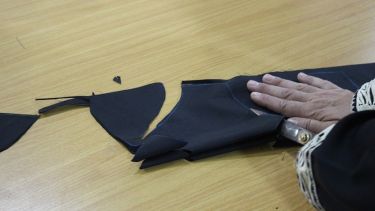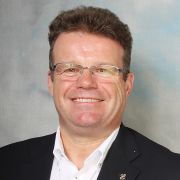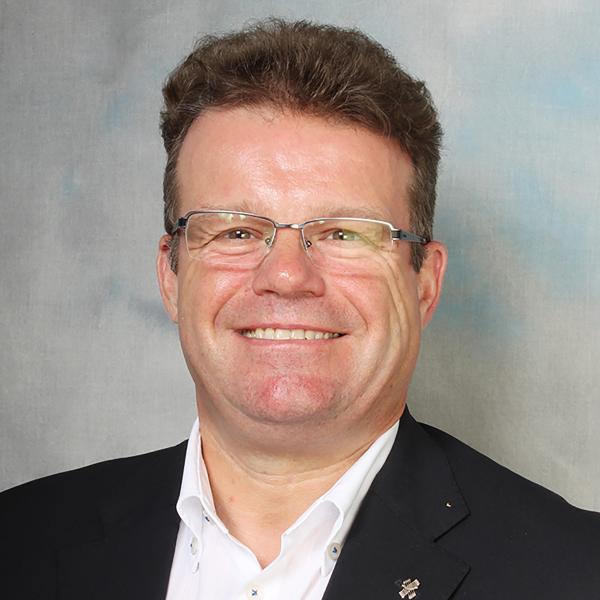A group of artists and scientists has teamed up with the UNHCR and Syrian refugees to develop new hand hygiene products and design and produce reusable masks, shields and gowns to help prevent the spread of Covid-19 in Jordan.
The collaboration with refugees living in Zaatari camp has developed personal protective equipment (PPE) using locally available, low-cost materials that can be repurposed after the pandemic, creating training and employment opportunities at a new mask production facility, while keeping people safe and reducing plastic waste.
The project, The People’s PPE, led by academics at the University of Sheffield and London College of Fashion, University of the Arts London (UAL), with researchers from Al Albayt University and the University of Petra, has received £766,675 of government funding provided through UK Research and Innovation’s Newton/Global Challenges Research Fund.
In March 2020, United Nations High Commissioner for Refugees (UNHCR) Jordan collaborated with Professor Tony Ryan (Department of Chemistry, University of Sheffield) and Professor Helen Storey (London College of Fashion, UAL) to develop innovative solutions for PPE for the people of Zaatari, utilising digital printing and sewing capabilities at their UK universities as well as facilities in the camp. Amid the PPE shortages that marked the beginning of lockdown in the UK, the team used the University of Sheffield’s makerspace iForge to design and manufacture laser-cut and 3D-printed face shields. In both the UK and Jordan, the team collaborated with refugees to make prototypes of masks, shields and gowns.
The People’s PPE project will use collaborative and interdisciplinary ways of working to help inform how Zaatari in Jordan can respond to the evolving crisis. In collaboration with research partners Al Albayt University and the University of Petra, the team will investigate how the availability of PPE affects people's attitudes and behaviours around risk, in order to address health threats. Digital technologies will expand the reach of the work, which will also address broader questions around the effects of PPE uptake on people’s sense of agency, ability and willingness to play a role in preventing and treating Covid-19.
There are currently 660,000 Syrian refugees living in Jordan, where the government has done extraordinarily well in suppressing transmission of the virus, recording 11 deaths from 1,100 cases.
However, as lockdown measures are eased, the UNHCR is preparing for a dramatic increase in Covid-19 transmission, and there is a pressing need for supplies of PPE compliant with Jordanian standards. With limited buying power, neither the Jordanian government nor UNHCR, who manage the camp, are well-placed to compete globally for supplies.
The People’s PPE will provide opportunities for people in Zaatari to become more financially independent and self-reliant especially in light of decreasing global aid budgets. It will also develop new products for hand hygiene in collaboration with Givaudan – the world’s largest purveyor of flavour and fragrance.
The government funding will allow the project to be scaled up, creating small-scale manufacturing jobs in Zaatari and using digital technology to share design innovations, create equitable distribution networks and gather data on health behaviours without face-to-face contact
Polymer chemist Professor Tony Ryan, Director of the Grantham Centre for Sustainable Futures at the University of Sheffield and Principal Investigator on the project, said: “This project is about empowering refugees in a moment of health crisis. I’ve spent years working with the people of Zaatari and learning from their incredible resourcefulness and creativity.”
“Faced with a global pandemic, we are working together to design and produce the protective equipment the refugees and their host community need to stay safe, while reducing plastic waste, creating jobs and building resilience within the camp community.”
Professor Helen Storey, UNHCR Designer in Residence 2020 at Zaatari Camp and Professor of Fashion Science at London College of Fashion, UAL said: “Since 2016 I have been working with communities in Zaatari. I have encountered a level of innovation and resilience which speaks to all our futures – together we are responding to the Covid-19 crisis with the same energy and resourcefulness that has been, and is, the hallmark of their remarkable lives.”
Moh’d Al Taher, Associate External Relations Officer at UNHCR, said: “The cooperation with the University of Sheffield and London College of Fashion, UAL, has resulted in training many Syrian refugee women in the Zaatari camp with skills in developing PPE. These skills created livelihood opportunities for refugees and supported the refugee community. UNHCR plans to cover the needs of the camp community with PPE by using high-quality and low-cost materials; innovative solutions could only achieve this.”
Professor Ryan and his colleagues at the University of Sheffield have been collaborating with refugees in Zaatari for a number of years, helping them to grow food using discarded mattresses, and recycle waste materials around the camp.
Professor Storey has worked in Zatari since 2016, initially through Dress For Our Time, an act of fashion activism, which raised awareness around the mass displacement of people and climate change. Helen is currently UNHCR’s Designer in Residence – addressing and responding to the needs of people, mostly women and girls, living in Zaatari, through projects which provide training and education to build livelihoods. Helen also assisted in the setting up of Zaatari’s first ‘Made in Zaatari’ centre which fosters entrepreneurial activity and provides a safe and supportive environment for women in camp.



